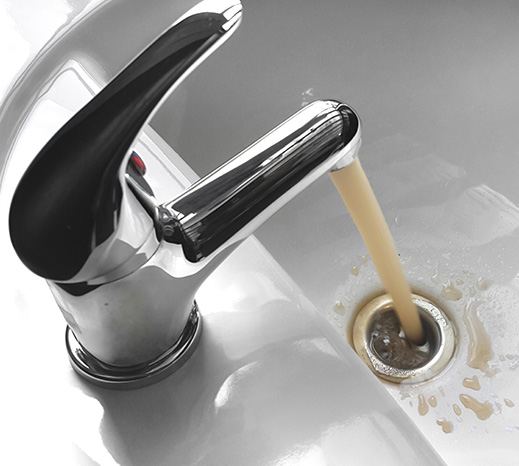Most people take their tap water for granted. They turn on the faucet, and out comes clean, fresh water to drink, cook with, and bathe in. But what happens when your tap water suddenly turns brown? What could be causing this discoloration, and is it something you should be worried about?
In this blog post, we’ll explore why your tap water might be turning brown and give some tips on telling when it’s time to replace your old galvanized pipes. Finally, we’ll introduce you to repiping services — the perfect solution for anyone whose plumbing needs a facelift.
So, if you’re wondering why your tap water is brown, read on for some answers.

What Causes Brown Tap Water?
Brown tap water can raise several questions, including whether or not it’s safe for daily use. Let’s go over what causes brown water and how to address it for your peace of mind.
Rusty Pipes
There are a few different reasons why your tap water might be brown. One possibility is that there is rust in your pipes. This can happen if your pipes are made of iron or steel, and it’s more likely to occur if they’re old.
Rust occurs when sediments, natural minerals, and chemicals in your water supply react with plumbing pipes. After years of exposure, this reaction starts to erode the line, which eventually leads to rusting.
Sediment Buildup
Another possibility is that there’s sediment buildup in your pipes. This can happen when mineral deposits accumulate over time and eventually block the flow of water through the tube.
When there is a sudden change in water flow, these sediments can be dislodged, causing the tap water to turn brown. This can often occur after activities like flushing fire hydrants or a spike in water pressure from the water supply. When this happens, it’s usually a sign that your water pipes might be aging or that there’s a potential issue with your plumbing system.
Corroded Water Heater
Your water heater might also be a reason you’re experiencing brown cold water or hot water. If you use a tank-based water heater, there’s a chance that, over time, the insides of the tank can corrode. This corrosion can ultimately be what causes brown water, especially when the water has been sitting in the tank for a while.
This issue is commonly seen in areas with hard water, which can speed up the corrosion process inside the tank. If you suspect your water heater might be the source of the problem, especially when you see brown tap water primarily from the hot water tap, it’s a good idea to contact a plumber for advice. At Lee’s Air, Plumbing & Heating, we offer a wide range of solutions to meet your needs, from complete water heater replacements to water heater repair in Clovis, CA, or the surrounding area. We’re happy to discuss potential solutions with you.
Breeding Grounds in the Plumbing System
Sometimes, specific sections of your plumbing system can become breeding grounds for minerals or even bacteria. When these sections experience an increase in water flow, they may dislodge the accumulated particles, leading to an unsightly brown hue in your water. If you suspect that you may be dealing with this specific problem, it’s important to reach out to a professional plumber for assistance. The sooner you get to the bottom of the issue, the better.
Municipal Water Supply Issue
Brown tap water can be caused by a problem with your municipal water supply. If the water treatment plant isn’t operating properly, it can cause the water to become discolored. If you rely on well water for your home, the supply may be brown before it enters your plumbing.
Since a municipal water supply issue can be what causes brown water, you may need to get proactive. To verify it, you might want to consider checking with your neighbors. If they are also experiencing brown tap water, it’s likely a broader problem affecting your locality.
Sudden Surge in Water Flow
A sudden surge in water flow, such as from a burst pipe or increased water usage, can disturb sediment and rust particles in the plumbing system and can ultimately be why your tap water is brown. This can happen after plumbing work, during periods of high water demand, or following repairs to the water supply system.
Fire Hydrant Flushing
Fire hydrant flushing is a routine maintenance activity performed by municipal water providers. It helps to clear out sediment and maintain the quality of the water supply. However, this process can temporarily disturb the sediment in the pipes. As a result, this simple maintenance task can potentially be why your tap water is brown.
If you know that hydrant flushing is taking place in your area, it’s best to avoid using tap water until the flushing is complete. Once it’s done, run your taps for a few minutes to clear out any remaining sediment.
How Long Does It Take for Water to Clear After Hydrant Flushing?
After hydrant flushing, it typically takes a few hours for the water to clear. During this time, it’s best to avoid using tap water for drinking, cooking, or laundry, as the discolored water can stain clothes and fixtures. Running the cold water taps for several minutes can help clear out the sediment and restore clear water faster.
Is Brown Water Dangerous?
Brown water is not usually dangerous to drink, but the taste and smell will likely be unpleasant. Large pieces of rust or metal flakes can harm your mouth, throat, or stomach. So look out for particles and debris in brown water.
While brown tap water may be off-putting, the presence of iron, which often causes a rusty color, isn’t harmful to drink. However, it’s essential to understand that this discoloration might be indicative of other contaminants in your drinking water. For instance, a rusty pipe can be a breeding ground for certain bacteria.
Regardless of health concerns, brown water is definitely unappetizing and can cause staining if used for laundry or dishes. If you’re concerned about the quality of your tap water, you can contact your local water utility to have it tested.
Is It Safe to Shower in Brown Water?
While brown water is not ideal for showering, it is generally safe to use for short periods. However, avoid using it if you have any open wounds or sensitive skin, as the sediment and rust particles can cause irritation. If the issue persists, contact professionals, like those at Lee’s Air, Plumbing & Heating, to inspect your plumbing system. As a reputable plumber in Fresno, CA, we can provide the plumbing repairs you need in a quick, professional manner.
What to Do If Your Tap Water Is Brown
Now that you know what causes brown water from a faucet, here are a few steps you can take to resolve the problem:
- Run the Water: If you think rust could be why your tap water is brown, run your taps for a few minutes to see if the water clears up. This can help flush out any sediment or rust that may have been stirred up.
- Check With Neighbors: Ask your neighbors if they’re experiencing the same issue. If they are, it’s likely a problem with the municipal water supply.
- Contact Your Utility Provider: Report the issue to your city’s utility provider. They can provide information about any maintenance work or issues with the water supply.
- Inspect Your Plumbing: If the problem persists, inspect your plumbing system for rusty pipes, sediment buildup, or a corroded water heater. You may need to contact a professional plumber for a thorough inspection and repairs.
Preventing Brown Water in Your Home
So, why is your tap water brown? As you can see, there can be more than one reason for this nerve-wracking issue. Although it’s important to understand what causes brown water from a faucet, it’s also critical that you know how to avoid it in the future. Regular maintenance of your plumbing system and water heater can help prevent brown water. Flush your water heater regularly, check for leaks or rust in your pipes, and make sure your plumbing is up to date. If you live in an area with high mineral content in the water, consider installing a water softener or updating your existing water treatment equipment.
Now that you know what causes brown water from a faucet, turn to Lee’s Air, Plumbing & Heating. We’re here to help if you’re currently facing residential brown water troubles. Whether you need a plumbing inspection, water heater tank repair, or help from our Sacramento leak detection professionals, we’ve got you covered.
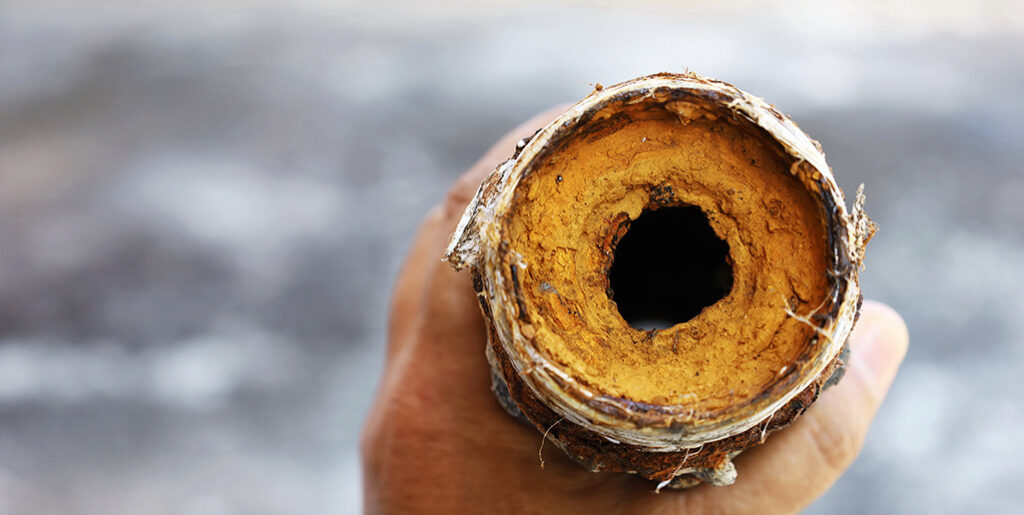
How to Tell If Your Pipes Need Replacing
If you’re not sure whether your brown tap water is caused by rust, sediment, or a problem with your municipal water supply, there are a few ways to check.
First, take a look at your faucets and fixtures. If they’re discolored, that’s a good indication that your pipes are also discolored. Second, run the water for a few minutes and see if the color clears up. If it does, the problem is probably with your municipal water supply. But if the water doesn’t clear up after running it for a few minutes, that’s a sign that you might have rust or sediment in your pipes.
One way to tell if your pipes need to be replaced is by checking their material. If they’re made of galvanized steel or iron, there’s a good chance they’re starting to rust on the inside. This can cause brown water and other problems, like low water pressure. Plumbing pipes should be replaced every 30 years or so to prevent corrosion and further damage.
Another way to tell if your pipes need to be replaced is by checking for leaks. Leaks can cause all sorts of problems, including water damage, mold growth, and increased water bills. If you’re aware of a leaking pipe it’s always best to have it addressed by a plumber immediately before the problem becomes worse.
The Benefits of Repiping Your Home
If you do have very rusty or sediment-clogged pipes, it’s worth replacing them once you have the budget. Not only will this improve the quality of your tap water, but it will also prevent damage to your fixtures and appliances.

Clean, Clear Water Supply
Brown water isn’t appealing. Not for cleaning, drinking, or any other reason you need to deliver water to your home. Repiping gives you peace of mind that you’ve got reliable, clean water every time you turn on the tap.
From making ice to cooking with clean water and bathing in clear H2O, brown water is a problem. If rusty pipes send brown water to your taps, a repiping service will improve your quality of life.
New pipes also improve the water pressure in your household. Because the new lines are free of sediment or mineral buildup, you get consistent water pressure throughout your plumbing.
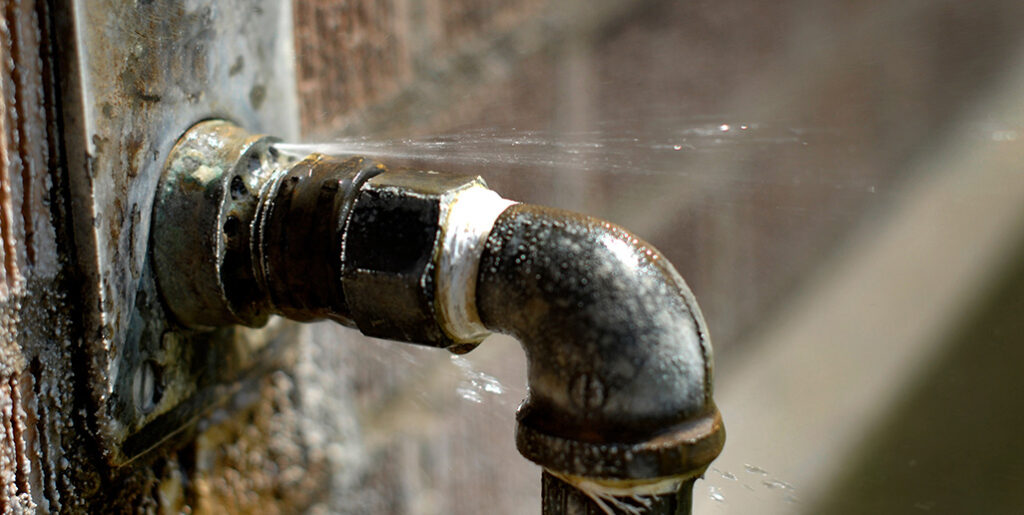
Leak-Free Plumbing
New pipes mean fewer plumbing problems. Replacing old rusty pipes will do more than make your water taste better. Repiping gives any homeowner the peace of mind that pipes and plumbing joints are leak-free and will stay that way!
The wear and tear on plumbing systems is inevitable over the years. All galvanized pipes begin to rust at some point, and repiping spares your plumbing from routine leaks and cracks for several years.
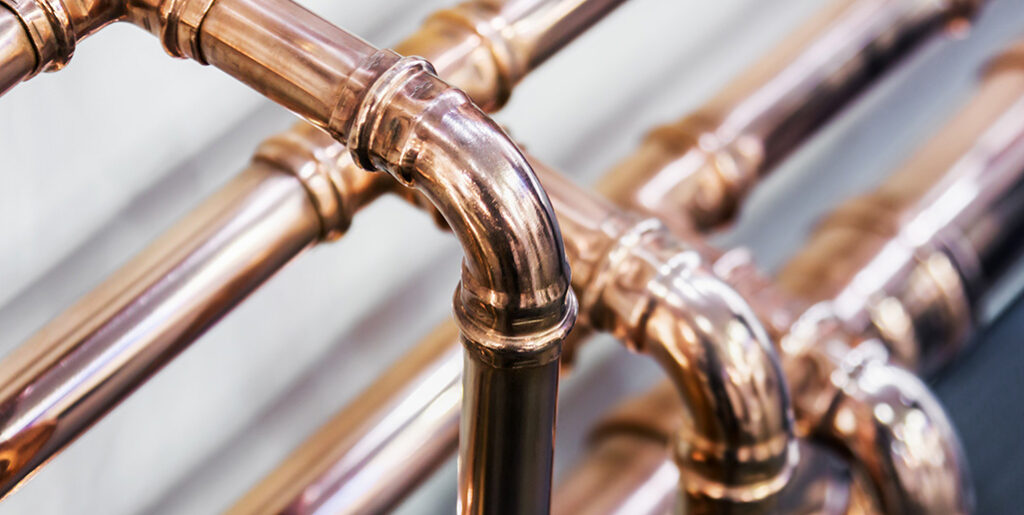
Increase the Value of Your Home
Additionally, repiping can help increase the value of your house. So if you’re thinking about selling in the near future, repiping is a great way to increase your home’s curb appeal.
Properties that are 30 years or older can definitely benefit from a plumbing overhaul.
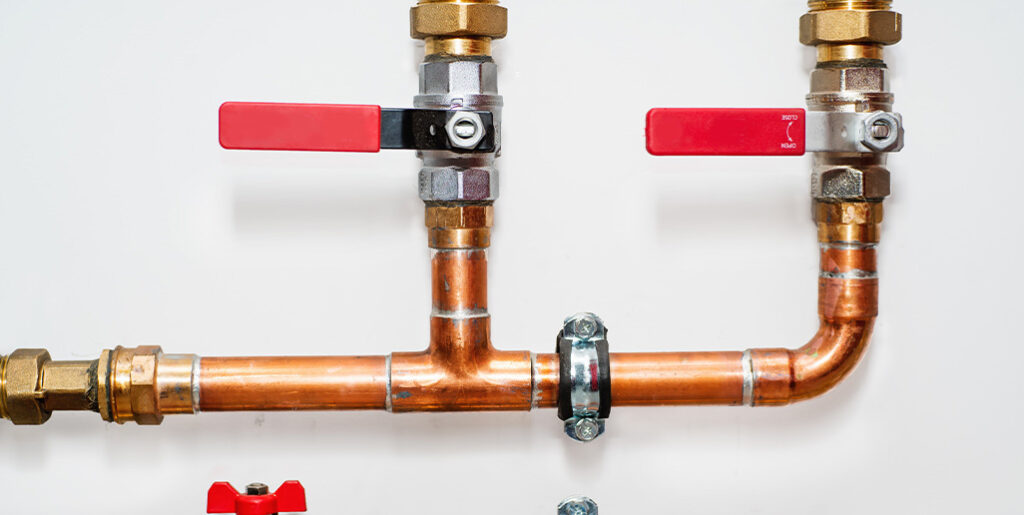
Bye-Bye Brown Water
Brown tap water can be an indication of underlying issues in your plumbing system that require attention. Whether it’s due to sediment buildup, a corroded water heater, or other plumbing challenges, you need Sacramento repiping experts you can trust to meet your needs. Fortunately, you don’t have to look far to find a reliable and reputable team for your plumbing services.
At Lee’s Air, we offer repiping services for both residential and commercial customers. We’ll come to your home or business and replace all of the affected pipes, and we’ll also dispose of the old material for you.
We’re well-versed in understanding what causes brown water and are here to guide you toward the most effective remedies. Our commitment to exceeding your expectations is evident in our A+ rating with the Better Business Bureau.
We offer copper piping and PEX piping to replace old, rusty pipes. Contact our plumbing specialists to learn more about our repiping services and how you can prevent brown water from pouring out of your taps.
Don’t let brown or rusty water disrupt your household. Ensure your water is safe to drink by getting in touch with our plumbers now! We look forward to providing the solutions your water system needs and restoring your peace of mind.

